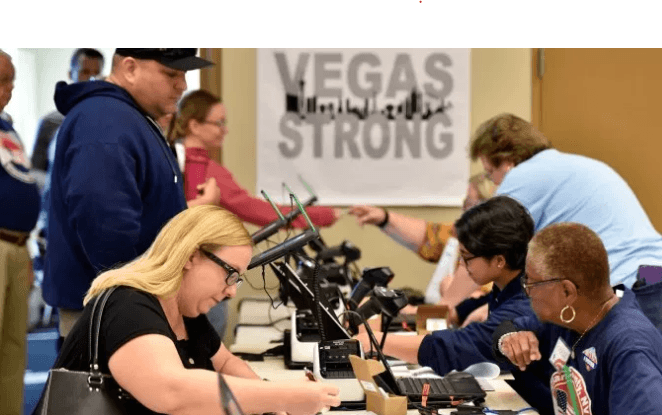Political Report
Nevada Eases Rights Restoration
But it will still retain a system that is harsh by national standards and will disenfranchise large numbers of residents.

This article is part of a state-based series on disenfranchisement.
Nevada, which has among the country’s strictest felony disenfranchisement laws, is changing its rules in January. But it will still retain a system that is harsh by national standards and will disenfranchise large numbers of residents.
These exclusionary rules will soon become the responsibility of state Democrats, who are set to take full control of Nevada’s government in 2019 for the first time since 1992.
Nevada is one of 12 states where people are still disenfranchised after completing a sentence. The upcoming reform (Assembly Bill 181) will keep Nevada on that list. While it will expand the groups who qualify for automatic rights restoration, anyone convicted of a higher-category felony and anyone with multiple convictions of whatever severity will remain disenfranchised even after serving a sentence. (AB 181 is thus weaker than Florida’s Amendment 4, which was adopted via referendum in November and does not contain the latter exception.)
All Nevadans who are incarcerated, on parole, or on probation will also remain disenfranchised. Other states are more inclusive on this front as well. Of the 13 states other than Nevada that will be under full Democratic control in 2019, seven enfranchise some or all such individuals.
AB 181 does make it easier for people to regain the franchise post-sentence if the reason they are barred from voting is a failure to meet the financial costs of probation or parole. That’s because it eliminates the rule that grants automatic eligibility to regain voting rights only to people who receive a so-called honorable discharge from probation or parole. “It’s a lot easier for people with money to finish their sentence honorably,” said Blair Bowie, a Campaign Legal Center fellow who has helped Nevadans regain their rights as part of the Restore Your Vote campaign. A dishonorable discharge can stem from many reasons, including an inability to pay court fines and fees.
By breaking the link between voting and honorable discharges, which Bowie calls a “hidden wealth barrier,” AB 181 will reduce the financial disparities in disenfranchisement.
That alone will cut into Nevada’s high rate of disenfranchisement. Four percent of Nevadans and 12 percent of African American Nevadans were disenfranchised as of 2016, a racial disparity is line with the vast inequality in the state’s incarceration system, according to a report by the Sentencing Project.
But Nevada will still disenfranchise tens of thousands come 2019.
“There’s definitely a movement toward getting rid of these outdated and punitive laws,” Bowie told me. “It’s great that Nevada is taking a small step in that direction, but there’s a lot more that they could do.”
According to Bowie, of the Nevadans whom Restore Your Vote assisted in 2018 only to discover that they were ineligible to have their rights restored, more were barred from voting because they had multiple convictions on their record than because of a dishonorable discharge. These people will still be disenfranchised under AB 181. Importantly, a wide range of offenses result in felony convictions; for instance, Nevada has a low threshold for when theft counts as a felony.
Those whose rights are not automatically restored have some other paths available to them, such as petitioning for an individual pardon. But those paths are “cumbersome and opaque,” according to Lauren Kaufman, an attorney at the ACLU of Nevada. “The process is so rare and obscure that no one really knows how to do the petitions,” Bowie agreed. Nevada restored the right to vote to less than 300 individuals over two decades through such post-sentence mechanisms, according to the Sentencing Project.
Nevada advocates also say that rules regarding who can vote are confusing enough that many people do not know that they actually are eligible, especially in the absence of adequate communication by the state’s public authorities. “We need a law that is so simple and so clear that you don’t need to get legal advice,” said Lonnie Feemster, the state director of the NAACP National Voter Fund.
Feemster called on Nevada to be bolder than just tweaking rights restoration rules or making the process easier to comprehend. “We shouldn’t try to make a law that’s essentially a holdover from the Jim Crow period into a law that’s understandable,” he told me. “We should get it eliminated, it shouldn’t be in the books.”
What are the prospects of future reform? AB 181’s legislative history signals political support for further steps. An early version introduced by Democratic leaders in 2017 automatically restored the rights of those who completed their sentence; restoration was to be immediate for most and to happen after two years for those convicted of more severe offenses. But the governor was Brian Sandoval, a Republican who had vetoed a similar bill in 2011, and so lawmakers weakened AB 181 to ensure passage. Sandoval signed it in June 2017. In January, Democrat Steve Sisolak will replace Sandoval.
None of the Democratic sponsors of AB 181 responded to requests for comment about whether they would push for more expansive reforms in the next session. Feemster said that he is advocating for Nevada’s legislature enfranchise everyone not presently incarcerated, and he added that his own conversations with lawmakers made him optimistic that the state would “correct the really grievous wrong that has been done to citizens of Nevada and to African Americans in particular.”
If the legislature does not act, or even if it does while not going as far as voting rights advocates would like, Nevada allows for popular initiatives. In November, for instance, Nevadans enabled automatic voter registration by approving an initiative for which organizers had collected signatures.
